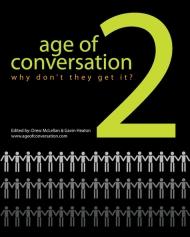If you have not heard, over the last several months I have participated in a global experiment to see if 237 marketing bloggers could write a book (As it turns out, we can and I think this book should be a hit!)
Please join us on the book launch tomorrow, as all proceeds will go to the children’s charity – Variety.
For those that cannot wait until tomorrow to see what I wrote (Mom, that’s you), here is a little hint:
Here is the full list of all the authors who participated:
Adrian Ho, Aki Spicer, Alex Henault, Amy Jussel, Andrew Odom, Andy Nulman, Andy Sernovitz, Andy Whitlock, Angela Maiers, Ann Handley, Anna Farmery, Armando Alves, Arun Rajagopal, Asi Sharabi, Becky Carroll, Becky McCray, Bernie Scheffler, Bill Gammell, Bob LeDrew, Brad Shorr, Brandon Murphy, Branislav Peric, Brent Dixon, Brett Macfarlane, Brian Reich, C.C. Chapman, Cam Beck, Casper Willer, Cathleen Rittereiser, Cathryn Hrudicka, Cedric Giorgi, Charles Sipe, Chris Kieff, Chris Cree, Chris Wilson, Christina Kerley (CK), C.B. Whittemore, Chris Brown, Connie Bensen, Connie Reece, Corentin Monot, Craig Wilson, Daniel Honigman, Dan Schawbel, Dan Sitter, Daria Radota Rasmussen, Darren Herman, Dave Davison, David Armano, David Berkowitz, David Koopmans, David Meerman Scott, David Petherick, David Reich, David Weinfeld, David Zinger, Deanna Gernert, Deborah Brown, Dennis Price, Derrick Kwa, Dino Demopoulos, Doug Haslam, Doug Meacham, Doug Mitchell, Douglas Hanna, Douglas Karr, Drew McLellan, Duane Brown, Dustin Jacobsen, Dylan Viner, Ed Brenegar, Ed Cotton, Efrain Mendicuti, Ellen Weber, Eric Peterson, Eric Nehrlich, Ernie Mosteller, Faris Yakob, Fernanda Romano, Francis Anderson, Gareth Kay, Gary Cohen, Gaurav Mishra, Gavin Heaton, Geert Desager, George Jenkins, G.L. Hoffman, Gianandrea Facchini, Gordon Whitehead, Greg Verdino, Gretel Going & Kathryn Fleming, Hillel Cooperman, Hugh Weber, J. Erik Potter, James Gordon-Macintosh, Jamey Shiels, Jasmin Tragas, Jason Oke, Jay Ehret, Jeanne Dininni, Jeff De Cagna, Jeff Gwynne & Todd Cabral, Jeff Noble, Jeff Wallace, Jennifer Warwick, Jenny Meade, Jeremy Fuksa, Jeremy Heilpern, Jeroen Verkroost, Jessica Hagy, Joanna Young, Joe Pulizzi, John Herrington, John Moore, John Rosen, John Todor, Jon Burg, Jon Swanson, Jonathan Trenn, Jordan Behan, Julie Fleischer, Justin Foster, Karl Turley, Kate Trgovac, Katie Chatfield, Katie Konrath, Kenny Lauer, Keri Willenborg, Kevin Jessop, Kristin Gorski, Lewis Green, Lois Kelly, Lori Magno, Louise Manning, Luc Debaisieux, Mario Vellandi, Mark Blair, Mark Earls, Mark Goren, Mark Hancock, Mark Lewis, Mark McGuinness, Matt Dickman, Matt J. McDonald, Matt Moore, Michael Karnjanaprakorn, Michelle Lamar, Mike Arauz, Mike McAllen, Mike Sansone, Mitch Joel, Neil Perkin, Nettie Hartsock, Nick Rice, Oleksandr Skorokhod, Ozgur Alaz, Paul Chaney, Paul Hebert, Paul Isakson, Paul McEnany, Paul Tedesco, Paul Williams, Pet Campbell, Pete Deutschman, Peter Corbett, Phil Gerbyshak, Phil Lewis, Phil Soden, Piet Wulleman, Rachel Steiner, Sreeraj Menon, Reginald Adkins, Richard Huntington, Rishi Desai, Robert Hruzek, Roberta Rosenberg, Robyn McMaster, Roger von Oech, Rohit Bhargava, Ron Shevlin, Ryan Barrett, Ryan Karpeles, Ryan Rasmussen, Sam Huleatt, Sandy Renshaw, Scott Goodson, Scott Monty, Scott Townsend, Scott White, Sean Howard, Sean Scott, Seni Thomas, Seth Gaffney, Shama Hyder, Sheila Scarborough, Sheryl Steadman, Simon Payn, Sonia Simone, Spike Jones, Stanley Johnson, Stephen Collins, Stephen Landau, Stephen Smith, Steve Bannister, Steve Hardy, Steve Portigal, Steve Roesler, Steven Verbruggen, Steve Woodruff, Sue Edworthy, Susan Bird, Susan Gunelius, Susan Heywood, Tammy Lenski, Terrell Meek, Thomas Clifford, Thomas Knoll, Tim Brunelle, Tim Connor, Tim Jackson, Tim Mannveille, Tim Tyler, Timothy Johnson, Tinu Abayomi-Paul, Toby Bloomberg, Todd Andrlik, Troy Rutter, Troy Worman, Uwe Hook, Valeria Maltoni, Vandana Ahuja, Vanessa DiMauro, Veronique Rabuteau, Wayne Buckhanan, William Azaroff, Yves Van Landeghem
Happy Tuesday!
Filed under: Books, Marketing | 2 Comments »




